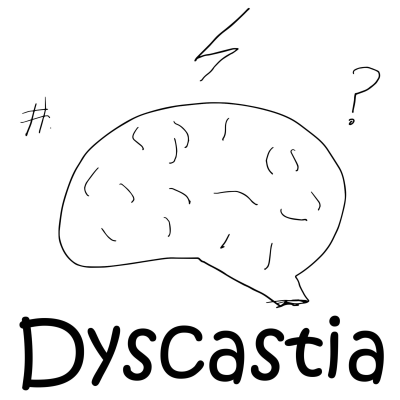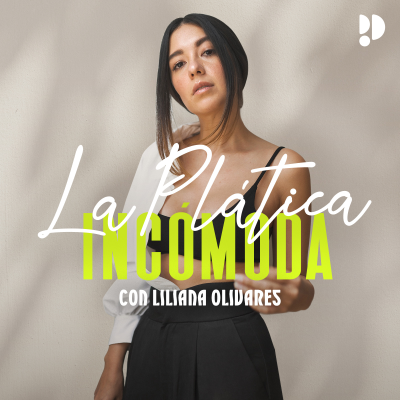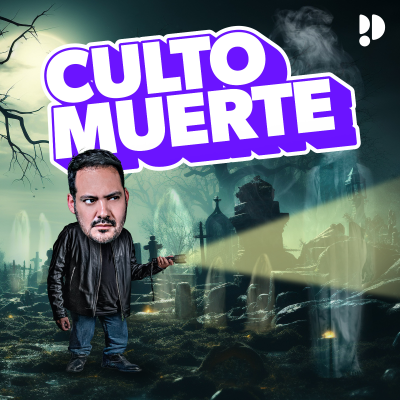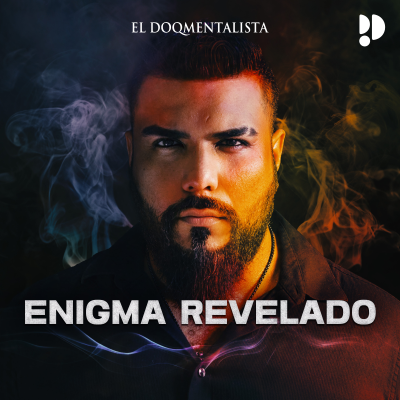
Dyscastia
English
Family
Limited Offer
2 months for 19 kr.
Then 99 kr. / monthCancel anytime.
- 20 hours of audiobooks / month
- Podcasts only on Podimo
- All free podcasts
About Dyscastia
A podcast for parents and educators about the best way to support kids living with learning difficulties. Hosted by specialist teacher Michael Shanahan, Dyscastia takes a positive, respectful look at supporting students living with dyslexia, dysgraphia, dyscalculia and associated neurodivergences such as autism and ADHD. Each episode focuses on practical, realistic strategies for reducing barriers to learning and building safe, supportive environments where students can achieve success. Conversations draw on Michael’s teaching experience and lived experience of ADHD, dyslexia, and dysgraphia, along with the perspectives of parents, educators, allied health professionals, and students themselves — all working toward the shared goal of supporting every child to feel understood and supported at school and beyond.
All episodes
22 episodesFive Common Mental Health Challenges For Kids Living With Learning Difficulties
In this episode, I’m joined again by clinical psychologist Valli Jones to talk about the mental health issues she most commonly sees in children and young people living with learning difficulties. We framed the conversation as a “top five”, not to rank problems, but to help parents and educators feel less alone and better able to recognise patterns in what they’re seeing. We talk about anxiety and school can’t, emotional and behavioural dysregulation, social difficulties and isolation, family stress and major life changes, and why some families seek a second opinion after earlier assessments. Throughout the episode, Valli shares practical insights drawn from her day-to-day clinical work. For more detailed show notes, visit the Dyscastia website [https://dyscastia.com/episodes/episode-22-five-common-mental-health-challenges-for-kids-living-with-learning-difficulties/].
Why Maths Word Problems Are So Hard
Why Word Problems Are So Hard In this episode, I talk with intervention teacher Sue Griffith about why word problems in maths are especially difficult for students living with learning difficulties, including dyslexia, dyscalculia, ADHD and autism. We explore how language, ambiguity and working memory overload can block understanding, and share structured strategies like CUBES and C.O.P.P.E.R. to support clearer problem solving. Full show notes, resources and some bonus content, ↗ https://dyscastia.com/episodes/episode-21-why-maths-word-problems-are-so-hard/ [https://dyscastia.com/episodes/episode-21-why-maths-word-problems-are-so-hard/]
ADHD Coaching with Sharon Collon
In this episode, I am joined by Sharon Collon from The Functional Family [https://www.thefunctionalfamily.com/]. We discuss ADHD coaching and how it works to support students living with ADHD, their teachers and families. We focus on practical strategies for supporting executive function, increasing engagement, dealing with emotions, and solving predictable problems. Sharon is an award-winning, credentialed ADHD Coach & Parent Consultant (who is families trained). She is passionate about helping families navigating ADHD create joyful, functional lives with ADHD. She loves anything that makes life easier with ADHD! Her husband and her three sons all live with ADHD (throw in some Autism, Tourettes, ODD, OCD, SPD and SLD too). As well as Sharon’s lived experience, she has been researching ADHD for over 17 years, studied at ADDCA in New York and is PCC credentialed with the International Coaching Federation. Sharon has runs on the board, assisting over 40,000 families since The Functional Family was created. Sharon has won multiple awards, including Business Awards – Outstanding Education Service, AusMumpreneur – Disabled Business Excellence, People’s Choice Leadership, People’s Choice Making a Difference and the Cook’s Community Award. Sharon lives in Southern Sydney and enjoys being near the sea, spending one-on-one time with her boys and her two boxer dogs… who are more like living cartoon characters than dogs. Are you interested in working with Sharon? Book a FREE 15-minute discovery call with Sharon HERE [https://calendly.com/sharonthefunctionalfamily/15-min-discovery-call-with-sharon]. During this call, Sharon will learn more about you and provide information about what services best suit your needs. Show notes I invited Sharon on because ADHD and learning difficulties often go hand in hand, with around 40% of people living with ADHD also living with dyslexia, dyscalculia or dysgraphia. [https://www.mnneuropsychology.com/articles/adhd-dyslexia-genes.html#:~:text=The%20study%20found%20that%20dyslexia,people%20with%20dyslexia%20and%20ADHD.] We know that attention, attitude and positive relationships have a significant impact on learning outcomes, particularly for students living with learning difficulties. Sharon shares some fantastic strategies for engaging students and supporting their (and our) mental health. What does an ADHD coach do? We start by looking at what ADHD coaching covers. It’s about making day-to-day life easier for students living with ADHD and their families and teachers. That includes things like time awareness, transitions, getting started on tasks, and building routines that actually work. Coaching is not therapy. It’s focused on how you make practical day-to-day activities easier. One of the big ideas in Sharon’s work is “predictable problems.” These are the same kinds of friction points that show up every day like getting dressed, brushing teeth, leaving the house and doing homework. The example Sharon gives about the toothbrush is a great one. The assumption was that it was a sensory issue. But it turned out the real problem was needing to go back upstairs after breakfast. The solution? Move the toothbrush downstairs. Done. Co-designing solutions A big part of Sharon’s process is co-designing solutions with the child. When students living with ADHD have a say, they often come up with smart ideas, and they’re more likely to stick with them if they’ve been part of designing the solution. You’ll hear us talk a lot about building autonomy and doing the planning when everyone is regulated. Not during the heat of the moment. What do Pinball Flippers have to do with ADHD? Sharon also explains her brilliant “Pinball Flippers Open / Closed / Neutral” model. It’s a way to quickly understand what state a student is in and how to respond. When a brain is open, it can take things in. When it’s closed, it’s overwhelmed and in fight, flight, freeze, or fawn mode. Our job is to help open the brain through praise, encouragement, novelty and whatever it takes to get our students engaged and open to learning. We also talk about how to support students in tutoring and classroom settings. I share one of my own strategies a collaborative whiteboard story that students add to each week. This builds in anticipation and (almost) guarantees a positive start to each session. Sharon suggests small “important jobs” like delivering a note to the office to give students a chance to regulate and reset. She also talks about planning exits in advance, so students don’t wait until they’re overwhelmed to step away. Body-doubling (getting expert help like tutors) can help a lot. Kids often respond well to the novelty of an external person, and as parents, we can’t take on everything! Homework – often a predictable problem Homework is a big, predictable problem for many students. For younger students, Sharon often works with families to step away from homework altogether unless it’s something that really matters. For older students, she focuses on breaking tasks down, setting time limits, and choosing the right time of day to work. Often, that’s not after dinner! Five-minute entries work well: “Let’s give it five minutes, and if it’s awful, we’ll stop.” And if you say five minutes, you stop at five minutes. That trust matters. We also touch on rewards and motivation. Reward charts with delayed incentives usually don’t land well for students living with ADHD. “Now” matters. “Not now” doesn’t. Immediate wins, visible progress, and having the end in sight make a much bigger difference. Throughout the episode, you’ll hear both of us come back to the same idea: home needs to be a safe space. School can be full-on, especially for students living with learning difficulties. If home feels the same, there’s nowhere for kids to self-regulate and get a break from the demands of school. Sharon’s approach is all about reducing pressure, supporting regulation, and building routines that give everyone, kids and adults, more gas in the tank. Resources mentioned * Predictable Problems Chart and lots of other freebies! [https://www.thefunctionalfamily.com/freebies] * Goblin Tools – Magic Todo task breakdown [https://goblin.tools/] * The Functional Family website and podcast [https://www.thefunctionalfamily.com/freebies] * The Functional Families Facebook Group [https://www.facebook.com/groups/thefunctionalfamilygroup] We’d love to hear your thoughts, questions and feedback. You can leave a comment or question at dyscastia.com [https://dyscastia.com/].
The Safe House Framework with Valli Jones
Full Show Notes available at dyscastia.com [https://dyscastia.com/episodes/episode-19-the-safe-house-framework-with-valli-jones/] In this episode, I talk with Valli Jones, a clinical psychologist from Queensland, about what it means to create a safe learning environment for students who live with autism, ADHD, dyslexia, and other learning difficulties. We focus on the idea that students learn best when they feel safe — not just physically safe, but emotionally and psychologically safe too. Valli Jones Valli Jones is a clinical psychologist and an autistic woman. She brings together professional expertise and lived experience to support families, educators, and health professionals in creating safe, respectful environments for neurodivergent children and young people. She is the creator of the Safe House Framework [https://courses.embracingneurodiversity.co/] — a model that blends years of clinical practice, formal training, and personal insight into what it really means to feel safe. Her work focuses on helping adults understand behaviour through a neurodiversity-affirming lens and on building strong, collaborative support systems around each child. At the heart of her work is a simple goal: to help create a world where all children know what it feels like to be understood. Show notes Valli walks us through a model she developed for supporting neurodivergent students called the Safe House Framework [https://courses.embracingneurodiversity.co/], which is designed to support everyone around a child — parents, teachers, tutors, psychologists, speech pathologists, OTs to collaborate more effectively. The framework is built around the idea of a house, with each part of the house representing a part of what students need to feel safe and understood. We also talk about what behaviour really means, what might be happening when a student shuts down or refuses to comply, and how important it is that we shift the way we think about neurodivergence in schools. This is especially relevant for teachers and tutors working with students who might seem ‘difficult’ or ‘defiant’ but are really just overwhelmed. What is the Safe House Framework? The Safe House Framework is a way of thinking about support for neurodivergent students that focuses on psychological safety and respect for difference, rather than control or behaviour management. Each part of the house is a metaphor: * Foundations – The mindset of the adults involved. This means starting from a neurodiversity-affirming perspective: recognising that differences are natural, not signs of something broken that needs fixing. * Floor Plan – The specific profile of a student: their strengths, their needs, and the kinds of support that will help. This includes things like sensory processing, communication differences, and interests. * Windows – How we view behaviour. Instead of assuming students are being naughty or defiant, we try to see behaviour as communication. Often, it tells us a student is overwhelmed, anxious, or just not coping. * Walls – The people involved: parents, teachers, allied health professionals, tutors — anyone who supports the student. The more these people can share information and work together, the stronger the support. * Door – The connection we build with the student. Relationships based on trust and understanding are at the core of psychological safety. * Roof – The systems that protect students: legislation, policies, and broader supports. * Landscape – The broader context: the school community, cultural attitudes toward difference, and the general level of understanding. The framework is available to download for free at embracingneurodiversity.co [https://embracingneurodiversity.co/]. What behaviour might be telling us One of the most important parts of the conversation was around how to understand behaviour. When students act out, shut down, avoid tasks, or insist on controlling things, it’s often not a matter of defiance or laziness. It’s a nervous system response. Valli describes five common stress responses: 1. Fight – A student lashes out, argues, or becomes aggressive. 2. Flight – A student leaves the room or tries to escape a situation. 3. Freeze – A student goes still, zones out, or appears to stop functioning. 4. Fawn – A student over-complies, masks distress, or tries to please everyone, but is exhausted or anxious underneath. 5. Flop – A student shuts down completely, maybe lying on a desk or becoming non-verbal. All of these are signs that the student may not feel safe in that moment, whether because of sensory overload, anxiety, fear of failure, or feeling misunderstood. Many of these behaviours get misinterpreted, especially in schools where compliance is expected. The idea here is not to excuse unsafe behaviour, but to understand what might be driving it — and to work proactively, not reactively. Making practical adjustments in schools Some key suggestions came up around how teachers and tutors can support students before issues escalate: * Flexible seating (e.g. standing desks, rocker stools, floor spaces) * Fidgets that don’t distract others * Giving processing time (Michael talks about using a 30-second pause) * Being careful with “cold calling” (students fearing being put on the spot) * Allowing movement or breaks without needing to ask * Using “timeout” or “reset” cards to self-regulate * Clear routines and preparation for transitions * Avoiding judgmental or dismissive language These kinds of supports can be made available to all students. The idea is that they remove barriers before they become problems, and prevent students from being placed in situations that overwhelm them. Why collaboration matters One of the biggest themes in the episode is the importance of adults working together. Often, a tutor doesn’t know what’s happening at school. The psychologist may not know what the parent is seeing at home. The school might be unaware of what allied health professionals are recommending. The Safe House Framework offers a shared language and a way to bring people together around the needs of a student. It encourages regular updates (e.g. a shared support plan reviewed every 6 months) The plan is deliberately written from the child’s perspective to humanise it (e.g. “I find loud noises overwhelming,” rather than “student has auditory sensitivity”) It can be used by parents, tutors, psychologists, and teachers alike, with everyone contributing their insights. Even a short 15-minute Zoom meeting twice a year can be enough to keep everyone on the same page. Advice for parents Parents can use the Safe House framework to coordinate support for their child, especially when schools are too overwhelmed to lead it. * The parent version of the training is available at embracingneurodiversity.co [https://courses.embracingneurodiversity.co/courses/safe-house-parents] * It includes 4 hours of video, workbooks, checklists, and a monthly Q&A * Membership is $15/month, but families can join for free by emailing Valli [hello@embracingneurodiversity.org] if cost is a barrier * Parents can also use it to better understand what allied health professionals do, and which types of support might be relevant for their child Advice for teachers Valli offers a version of the training specifically for: * Teachers [https://courses.embracingneurodiversity.co/courses/safe-house-educators] and * Schools [https://safehouseschools.org/]. * It covers the Safe House Framework in full, including how to understand autism and ADHD through an affirming lens. * There’s a focus on universal design — removing barriers for everyone before putting in individual accommodations. * It includes training on executive functioning, emotional regulation, communication, and social understanding * There’s also a component on teacher wellbeing, recognising that none of this is sustainable if teachers are burning out. Whole schools can also take part through the Safe House Schools program [https://safehouseschools.org/], which includes layered support and ongoing development. Shifting the Paradigm Around Autism in Education In this 50-minute webinar, Valli offers her perspective on the disconnect between the education system and the autistic students it is struggling to engage, and proposes a way forward. Reflections We also spoke about how important it is to have a plan in advance. Michael shares the idea of a “what if” list — where he imagines challenging scenarios and decides what strategies he’ll use before they happen, so he’s not just reacting in the moment. Valli supports this and says that kind of proactive thinking reduces the risk of nervous systems escalating together. The point isn’t to follow a script — it’s to be ready and to feel less caught off guard. Where to start If you’re a parent, teacher, tutor or allied health professional and you’re not sure what to do next, the Safe House Framework gives you a starting point. Even reading through the structure can help you think differently, pause, and ask better questions. If collaboration isn’t happening yet, you can be the one to initiate it. We’d love to hear you’re thoughts, questions and feedback.
The Literacy Support Kit with Sally Andrew
In this episode, Michael Shanahan is joined by experienced specialist dyslexia tutor Sally Andrew to discuss The Literacy Support Kit (LSK)—a comprehensive set of resources designed to support children for whom standard literacy intervention programs are too difficult. Sally Andrew Sally holds a Postgraduate Diploma in Dyslexia and Literacy from the University of York, UK. Sally has been tutoring students with dyslexia for 25 years and has trained many parents and educators in evidence-based multisensory interventions for dyslexia. Sally is the director of By Your Side Tutoring. Sally formally ran the popular Teaching Students with Dyslexia (TSD) [http://hansberryec.com.au/index.php?action=home&pageid=55] suite of training for Specialist Multisensory Literacy Teachers. Sally co-developed the Literacy Support Kit and Word Cracker suite of morphology resources. Show notes Michael and Sally explore the challenges faced by students living with dyslexia, dysgraphia, intellectual disability, and fine motor difficulties, sharing strategies and practical solutions to bridge gaps in literacy instruction. They emphasize the importance of customized resources, multi-sensory learning, and breaking skills into fine-grained steps to ensure student success. Key Topics Discussed 1. Why Some Students Struggle with Standard Intervention * Not all students progress at the expected rate in structured literacy programs. * Some need more fine-grained steps to break down learning concepts. * Kids living with dyslexia, dysgraphia, ADHD, and intellectual disability often require additional scaffolding. * The LSK provides targeted resources to address these challenges. 2. The Importance of Teacher Discretion in Literacy Instruction * Teaching should not be one-size-fits-all. * Experienced tutors develop custom resources based on student needs. * If a student is struggling with a concept, slowing down and focusing on prerequisite skills is essential. * Using varied formats to present the same material helps build automaticity. 3. Supporting Kids with Alphabet Difficulties * Many students, even in Year 5 or 6, do not truly know the alphabet beyond the song. * Some students believe “LMNOP” is a single letter due to how they learned the alphabet song. * Intervention strategies: * Using picture alphabets to build phoneme awareness. * Matching games to reinforce letter recognition. * Writing letters over pre-written models to build confidence. 4. Helping Students Blend Sounds (Phonemic Awareness) * Some students struggle to blend sounds into words, making decoding very difficult. * Key strategies in LSK: * Chunking sounds together rather than focusing on individual phonemes. * Onset and rime activities (e.g., working on “at,” “it,” “in” before full words). * Repeated exposure through varied activities to build automaticity. 5. Handwriting as a Literacy Barrier * Fine motor control issues can make writing exhausting. * Poor handwriting can lead to low confidence and avoidance of writing tasks. * LSK handwriting support includes: * Pre-writing activities (tracing, erasing letters, solving mazes). * Cursive instruction to improve fluency. * Explicit teaching of letter formation and spacing. 6. Keeping Students Engaged with Repetitive Learning * Students need hundreds of repetitions to master basic literacy skills. * Standard drills can be boring and frustrating. * LSK provides a variety of engaging activities, including: * Chunky Pig – A game reinforcing phoneme blending. * Make-a-Chunk sheets – Matching and handwriting exercises. * Tracking sheets – Strengthening phonemic awareness. * Close reading sheets – Filling in missing words from context. 7. Addressing Sticking Points in Phonics Programs * Some students get stuck on complex spelling rules (e.g., C/K rule, open/closed syllables). * LSK removes these difficult concepts temporarily so students can continue making progress. * Focus remains on: * Mastering short vowel sounds before moving to long vowels. * Learning suffixes before tackling multi-syllable words. 8. High-Frequency Words: A Key Component * High-frequency words are essential for reading fluency. * Traditional word lists cause stress for many students (e.g., weekly school spelling tests). * LSK includes: * Traceable worksheets for repeated practice. * Snakes and Ladders game using high-frequency words. * Word search puzzles for additional reinforcement. 9. The Power of Repetition and Daily Practice * Flashcard Decks: Each new letter or sound is added to a child’s personal deck. * Spelling Drills: Structured practice with traceable letters for extra support. * Daily reinforcement builds automaticity without overwhelming students. 10. Who Can Use the Literacy Support Kit? * Teachers and tutors looking to support struggling students. * Parents who want a structured, easy-to-follow literacy program. * Intervention specialists who need additional materials to customize instruction. * The LSK is simple enough that parents can use it at home, even without formal training. Resources & Links The Literacy Support Kit (LSK) [https://wordcracking.xyz/literacy-support-kit-quick-guide/] Word Cracking Membership: [https://wordcracking.xyz/registrations/] Now includes LSK resources, morphology materials, and training courses. Games and Activities for Literacy [https://wordcracking.xyz/lsk-literacy-games/] Handwriting Support Resources [https://wordcracking.xyz/lsk-handwriting-guide/] Final Thoughts Sally and Michael reflect on their years of experience working with children living with learning difficulties and how the most challenging students make you a better teacher. They emphasize the importance of adapting instruction to fit individual student needs and giving students small successes to build confidence. Subscribe to stay updated on new resources and teaching strategies. Have questions or feedback? Leave a comment or contact us. This episode is packed with practical advice, strategies, and free resources to support struggling readers and writers. Tune in and explore how the Literacy Support Kit can make a difference.
Choose your subscription
Limited Offer
Premium
20 hours of audiobooks
Podcasts only on Podimo
All free podcasts
Cancel anytime
2 months for 19 kr.
Then 99 kr. / month
Premium Plus
Unlimited audiobooks
Podcasts only on Podimo
All free podcasts
Cancel anytime
Start 7 days free trial
Then 129 kr. / month
2 months for 19 kr. Then 99 kr. / month. Cancel anytime.





































